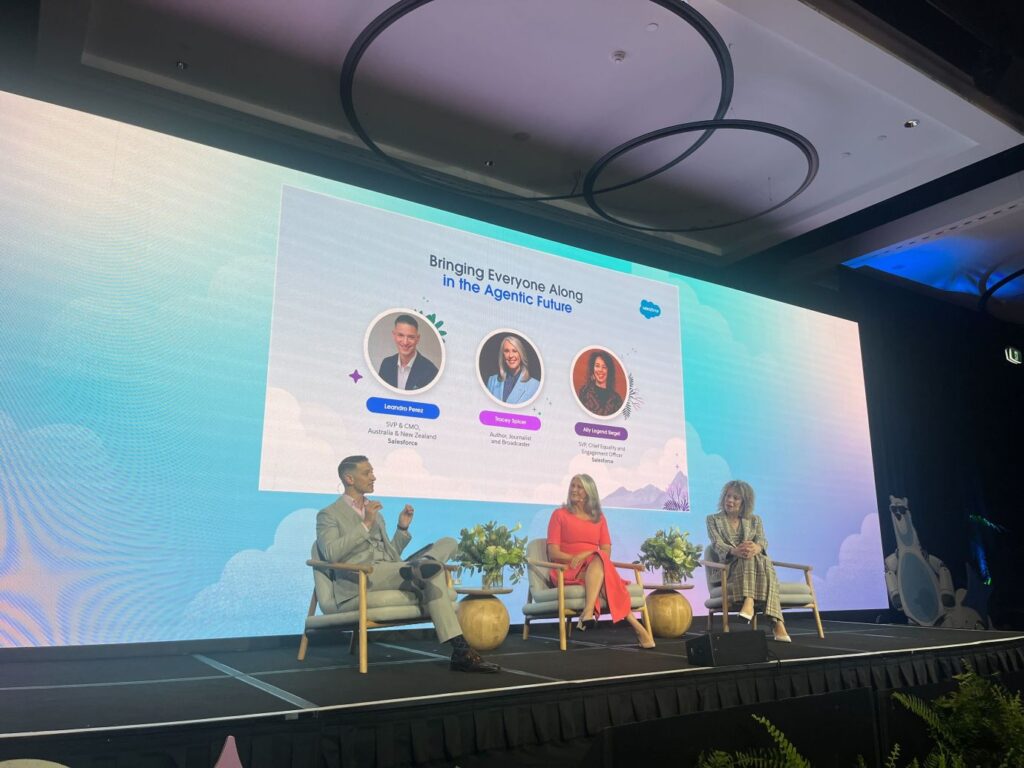When Tracey Spicer’s now 20-year-old son was 11, he told her over breakfast one morning that he wanted a “robot slave”.
“What on earth are you talking about?” she replied – later realising it was something he’d picked up from watching South Park.
Spicer shared this anecdote at Salesforce’s Agentforce Summit 2025 on Tuesday, where she spoke on a panel alongside Chief Equality and Engagement Officer at Salesforce, Alexandra (Ally) Legend Siegel. The panel was hosted by Leandro Perez, Senior Vice President & Chief Marketing Officer at Salesforce Australia/New Zealand.
The session focused on agentic AI, a type of artificial intelligence where systems autonomously make decisions and take actions to achieve goals with minimal human intervention. It discussed how we can ensure everyone is brought along as we live through what is the biggest technology transformation of our lifetime.
“As a lifelong journalist and feminist and someone passionate about social justice, I had an epiphany that this idea about women and girls being servile in the home was being built into the female voice chatbots, because at that time, almost all of the chatbots in the business and finance sector had male voices,” said Spicer, who is the author of the book Man-Made: How the bias of the past is being built into the future.
“This set me on a really deep dive over seven years to look at how the bias is embedded in the datasets and the algorithms and deep through machine learning. But importantly, for this conversation, what we can do to reduce and remove the bias.”
On the panel, Ally Legend Siegel, Chief Equality and Engagement Officer at Salesforce, said the future of AI and agentic technology is here and “we can either lean out or we can lean into this future”.
“There’s so much possibility when we think about the limitless human potential that AI and agents can unlock. But also we know that bias exists all around us, and bias does become reflected into our behaviors, into our processes, and then ultimately into our technology,” she said.
“We have to be really intentional about making sure we have folks have a seat at the table to make sure that we’re building AI and agents for everyone, and that we’re mitigating harm whenever possible.”
Spicer said she is now more optimistic about the future of AI than she used to be.
“The way I view the future now, particularly with agentic AI, is that it brings all the best of those previous industrial revolutions to take us forward to the next level. And we’ve really got to view it through the lens of: how can this benefit not only business but broader humanity, to take us forward?” she said.
Siegel, who is based in San Francisco, said it’s critical that as AI technology continues to evolve, we are intentional about making sure the technology is created with different perspectives.
“[It’s about] making sure you have the mechanism to iterate as soon as you get that feedback or you’re aware of that bias,” she explained. “It’s an ongoing process.”
Spicer said it’s important that everyone, regardless of their gender, ethnicity or location, is brought along for the AI journey.
“I sit before you proudly as a 57-year-old, gray haired woman. I do not look like a tech guy. I don’t have a T shirt and sneakers,” she said.
“I think a lot of us, particularly as women and old people, feel like we don’t have a place in this revolution. And because of that, it holds us back from training or re-skilling or even using this technology. And that’s incredibly dangerous, because if we don’t play with it, if we don’t become autodidacts and sort of teach ourselves, if we don’t learn about it, then our interests and ourselves aren’t contained in the data sets of the future.”
Siegel agreed and pointed out that women are much less likely to use AI in their day-to-day work.
“We are missing out on the opportunity to unlock our potential, to free us up from those menial tasks…there’s a lot of research about how women take on more of those menial tasks. So it’s having a compounding effect,” she said.
“It’s really important that we address that we’re seeing a lot of fear.”
These fears about bias and the impact of technological change on the job market are real. Last week, the United Nations Jobs International Labour Organization released a report that said jobs conventionally done by women are at a higher risk of being transformed by AI than those done by men, especially in high-income countries.
But Siegel says we have the opportunity to ensure marginalised voices are at the helm of AI.
“We know that marginalised communities have been the communities most impacted by most of these revolutions, most of these technology shifts,” Siegel said.
“And so I see on the other side, an opportunity to write a wrong to rewrite history. We are in the moment of a technology change. We’re in flux. So this is a moment where we can actually do something different. We can make sure that marginalised voices and perspectives actually are at the helm of this technology.
“[We can] shift so our stories, our perspectives, our insights are reflected in the technology, and we can actually solve problems that we haven’t been able to solve, or help to create solutions that we haven’t even imagined yet.”


